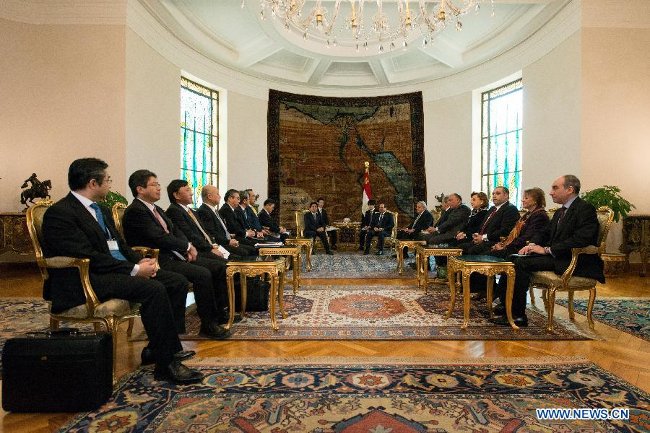|
|
Japanese Prime Minister Abe Visits Egypt, Meets President El Sisi
24 January 2015
(EIRNS)—Japanese Prime Minister Shinzo Abe was in Cairo for an official visit over Jan. 16-17. Egyptian Prime Minister Ibrahim Mahlab underlined the strong relations linking Egypt and Japan, reiterating Cairo’s keenness on boosting ties at all levels, according to the Egyptian State Information Service. Abe met with Mahlab as well as with President Abdel Fattah El Sisi. Also in the meeting with Mahlab were Egypt’s ministers of trade, transport, antiquities, and international cooperation. The meeting took up projects funded by Tokyo and participation of Japanese businessmen in an international economic conference to be held in Cairo in March. The Japanese delegation accompanying Abe numbered more than 100 government officials and business leaders. The Japanese Prime Minister renewed support to Cairo in its transition to democracy by the road map adopted after the June 30, 2013 revolution. Abe was on a multi-country tour that also took him to Israel, Lebanon, Jordan, and the Palestinian Authority. While in Cairo, Abe told a meeting of the Japan-Egypt Business Committee, "It goes without saying that the stability of the Middle East is the foundation for peace and prosperity for the world, and of course for Japan." He continued, "Should we leave terrorism or weapons of mass destruction to spread in this region, the loss imparted upon the international community would be immeasurable." "I will pledge assistance of a total of about $200 million for those countries contending with ISIL, to help build their human capacities, infrastructure, and so on," said Abe. In addition to the $2.2 billion in assistance Japan pledged for the Middle East two years ago, Abe said his government would provide another $2.5 billion in non-military assistance in fields such as humanitarian assistance and infrastructure. This includes $360 million in loans for projects in Egypt, for an airport and a power grid. "These are intended to contribute to Egypt’s development, and by extension, to widening the foundation for stability across the entire region," he said. Dean Andromidas |


